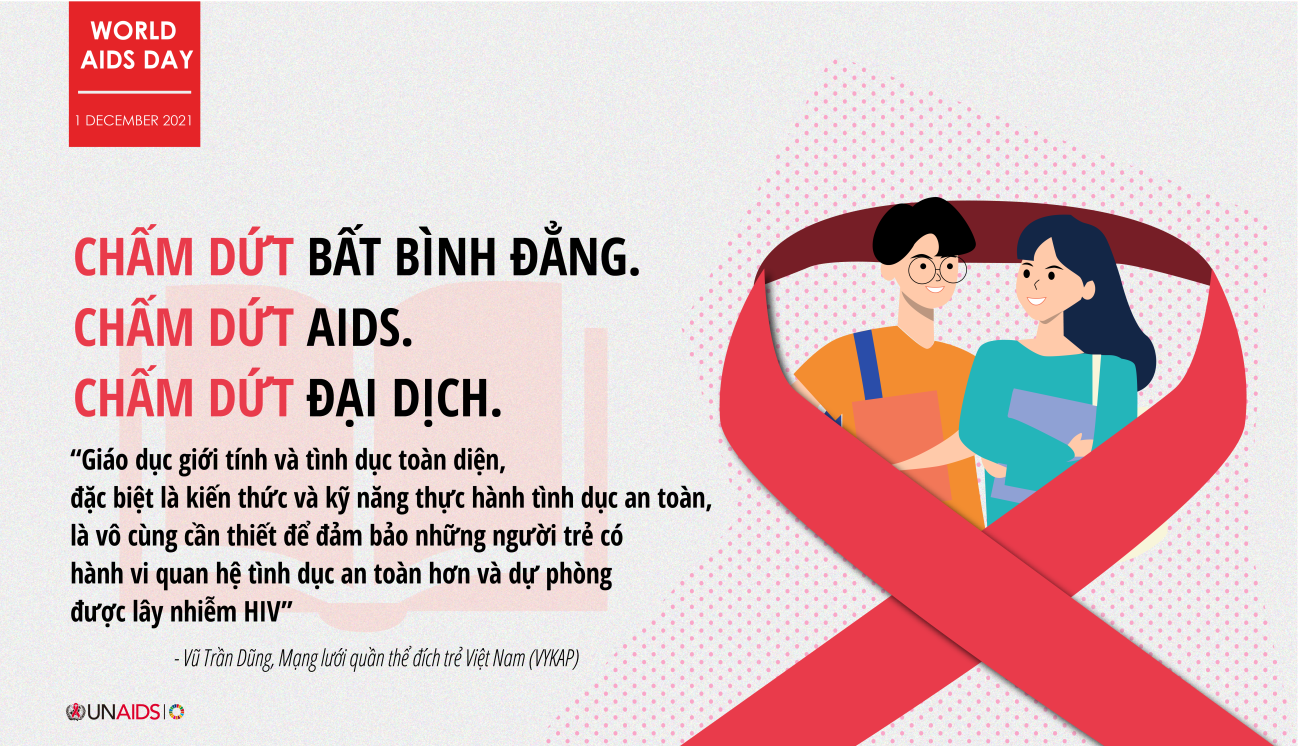Within the framework of the 2021 UN Free & Equal campaign, the Viet Nam Network of Young Key Populations (VYKAP) organized outreach, information sharing, and counseling on HIV and safe sex on 6 November 2021.
This community-led activity provided a reliable and reassuring environment for the youngsters to have HIV screening, with pre-test counseling and guaranteed confidentiality of the information.
Two university students among those who volunteered for HIV screening tests turned out reactive. Confirmatory tests were done and results were positive.
Mai (not her real name) is a transgender woman who was assigned male at birth in 2003 and she was raised as a boy in a suburban district of Hanoi. She started being sexually active at the age of 15 with a male sexual partner. After moving away from family to study college in Hanoi downtown, she connected with multiple sex partners through social media platforms.
Mai “filtered” her sex partners simply by observing if there are any antiretroviral drugs at the persons’ place, without explicitly checking their HIV status or viral load. Tested as HIV-negative in her first self-screening test in May this year, she did not use condoms consistently with her sex partners from that time to October, which was the period of the fourth wave of COVID19 in Viet Nam.
“Is HIV infection caused by the scratches when I fell down on the street near the trash collection area, or the bruises I got in the cafeteria?” Instead of attributing to her unprotected sexual behaviors, she falsely suspected that her HIV infection was caused by her minor abrasions in the first place. The fragmented or lack of comprehensive sexual health
education knowledge hampered the ability of the youngster to take effective HIV harm
reduction and health care measures.
Although she has come actress various sexual and reproductive health information through the MSM community’s social media platforms at a very young age, her knowledge of HIV is still inadequate and shallow. There is also a gap between her HIV knowledge, her mindset, and skills in practicing safe sex measures consistently.
Another HIV-positive case is Duc (not his real name), who was born and grew up in a northern mountainous province in Viet Nam. The 21-year-old man nearly fled from the testing booth out of shock when he received his HIV-reactive result.
Realizing his attraction to men at the age of 18, Duc started to be sexually active. Mistaking that homosexual behavior is less risky than heterosexual behavior, he did not use condoms and other protective measures regularly.
It was his very first time to receive HIV information, counseling, and screening test. “HIV is always associated with sex work and drug use. To avert peer discrimination, I tried all means to hide the fact that I am taking ARV drugs.” Duc shares, “I feel like I can never love again.”
Young men who have sex with men (MSM) are especially at high risk of HIV transmission. According to the Viet Nam Administration for HIV/AIDS Control (VAAC), more than 79% of
newly diagnosed HIV-infected cases in the first nine months of 2019 were through sexual
contacts, while transmission through drug injection accounted for only 9.9%. HIV prevalence among the MSM group rose from 5.7% in 2015 to 13.3% in 2020. Some limited available data in Ho Chi Minh City suggested that HIV prevalence among surveyed transgender women can be as high as 16% -18%.
“Comprehensive sexuality education in particular knowledge and skills for practicing safer sex is essential to equip the young key populations properly for safer sex behaviors and HIV prevention.”, said Mr. Vu Tran Dzung, Viet Nam Network of Young Key Affected Population (VYKAP).
UN in Viet Nam is calling for greater efforts in filling the gap of knowledge on sexuality, sexual and reproductive health both in school and outside of school. Comprehensive sexuality education is a vital intervention—to prevent HIV among young people and also to empower young people to recognize and protect their overall sexual health and well-being. With comprehensive and accurate knowledge, young people can make responsible and safer decisions about sex and their sexuality.
Reference
UNFE (2021). 2021 UN FREE & EQUAL CAMPAIGN LAUNCH: FOR SAFER SCHOOLS FOR LGBTIQ+ PEOPLE. Access from: https://vietnam.un.org/en/156414-2021-un-free-equal-campaign-launch-safer-schools-lgbtiq-people?fbclid=IwAR2SpQBNm999FKGt8TSEOEUyembGTsOc-RnzTNjMllfVXd1qtNnDr7SrHkM





